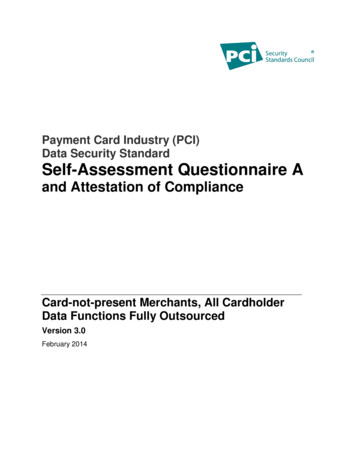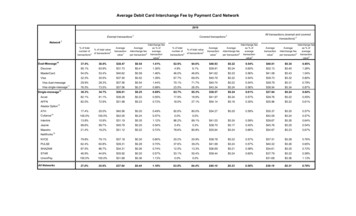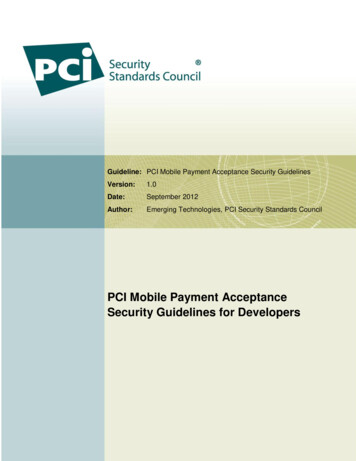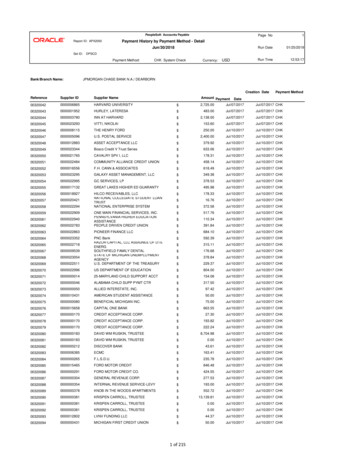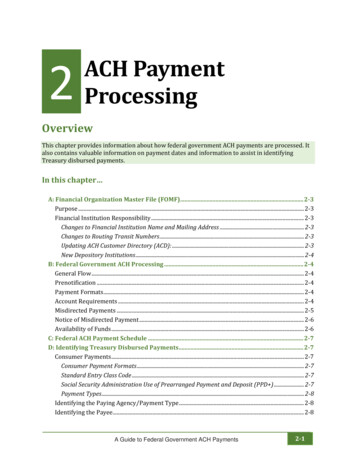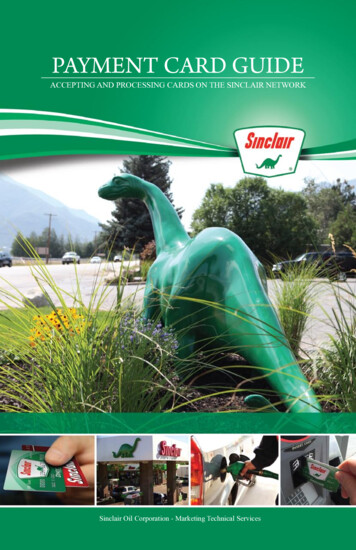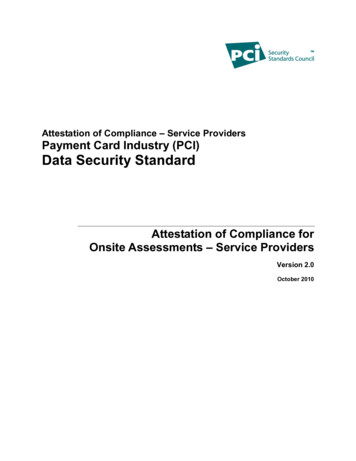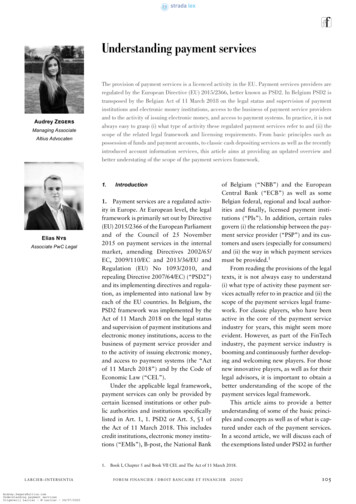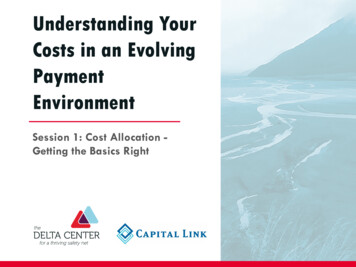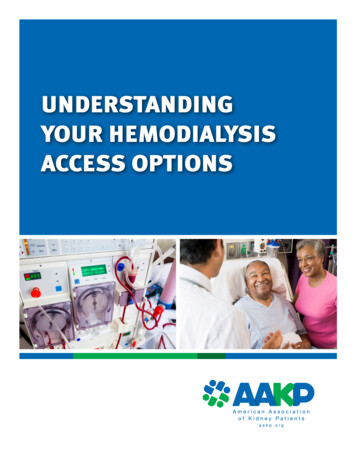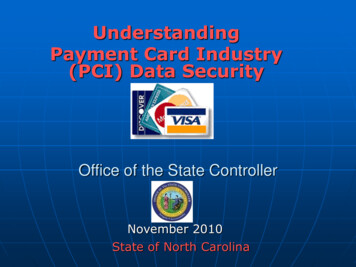
Transcription
UnderstandingPayment Card Industry(PCI) Data SecurityOffice of the State ControllerNovember 2010State of North Carolina
The EnemyMajor SecurityBreaches11 TJ-MaxHackers caught TJ-Max US Heartland Ukraine Hannaford Foods China BJ’s Wholesale Estonia Office Max Belarus Boston Market Barnes & NobleIn-house staffFines & Lawsuits70 % of alldatabase breachesare internalTJ-Max - 60 MillionMajor PR impactHacker
Fiscal Staff ResponseAfter a Security Breach I thought my IT Department was taking care of that I thought we had a secure website with a firewall I didn’t know my filing cabinets had to be secured I didn’t know 70% of all database breaches are internal I thought outsourcing to a vendor relieved me of theresponsibility The merchant agreement with the bank didn’t specificallyindicate we would be responsible for fines
Data Security Policies Participants in OSC’s Master Services Agreementwith SunTrust Merchant Services (STMS) aresubject to certain policies regarding data securityTwo specific OSC E-Commerce policies: Security and Privacy of Data Compliance with PCI Data Security Standardshttp://www.osc.nc.gov/SECP/SECP Policies.htmlPolicies require agencies to: Adhere to Card Association Rules and standardsof the PCI Data Security Council Enroll in Validation Service provided byTrustwave to attest validation of compliance
Types of Card CaptureRequirements to be followed are determined primarily by the card capturechannel (card capture method) being utilized, and whether a third-partyservice provider is used or notCard CaptureCard-PresentCard can be swiped Credit Cards (with logo) Signature Debit Card (logo) PIN Debit Card (May or maynot have a logo) Face-to-FaceCard Not-PresentCard cannot be swiped Credit Cards (with logo) Signature Debit Card (logo) PIN-less Debit (Requiresspecial enrollment) Through WebMail Order / TelephoneOrder (MOTO)Interactive Voice Response
Capture Methods POS Terminal Analog telephone line or via Internet connection Card data swiped or keyed PTS (PIN Transaction Security) applies if debit cards accepted –Triple DES Encryption POS Software Utilizes external-facing IP Addresses (Network) Card data swiped or keyed PA-DSS (Payment Application Data Security Standard) applies tosoftware purchased from vendors Virtual Terminal Web-based POS terminal instead of POS terminalGood for MOTO (Mail Order / Telephone Order)Available from third-party service provider (PayPoint) or from CPSSelf Assessment Questionnaire C or D requiredInternet and IVR In-house hosted capture application (generally an API) Third-party hosted capture application (service provider) –Use of a service provider requires written agreement (Req. 12.8)
Parties to Card TransactionsCard Issuing BanksAmexDiscoverVisa / MasterCardMerchant BankCard Processor(STMS / First Data)Visa and MC only havecontractual arrangementswith banks, not with anymerchants.Depository bank notnecessarily same as themerchant bank (Wachovia)Merchant(Governmental Unit)Gateway Service(Service Provider)Common PaymentService or 3rd PartyCaptureApplication Vendors
Data Security PuzzleHackerPA-DSSCISPQSAASVSDPPTSMerchantSAQPCI DSSNC ITPA
Data Security Terms CISP – Visa’s Cardholder Information Security Program SDP – MasterCard’s Site Data Protection Program PCI SSC – Payment Card Security Standards Council PCI DSS – Payment Card Industry Data Security Standard PCI PA-DSS – PCI Payment Application Data Security Standard PTS – PIN Transaction Security Standard NC ITPA – NC Identity Theft Protection Act (SB 1048 / 2005) QSA – Qualified Security Assessor (e.g., Trustwave) ASV – Approved Scanning Vendor (e.g., Trustwave) SAQ – Self Assessment Questionnaire (A, B, C, or D) ROC – Report on Compliance ISA – Internal Security Assessor
Payment Card IndustryData Security CompliancePCI DataSecurity CouncilVisa’sCISP(Visa, MC, Amex, Disc. JCB)Merchants(Governmental Unit)MerchantBanksMasterCard’sSDPService ProvidersGovernmental Units (As Merchants) and their vendors are subject to: Standards of the PCI Security Standards Council PCI DSS (Payment Card Industry Data Security Standard) PCI PA-DSS (PCI Payment Application Data Security Standard) PTS (PIN Transaction Security Standard) Rules of the Card Associations Visa’s CISP and MasterCard’s SDP – Based on Levels Proprietary Card Companies security policies (Amex; Discover)
PCI DSSPayment Card Industry Data Security Standard Standard that is applied to: Merchants (Government Units) Service Providers (Third-party vendor, gateways) System (Hardware, software) For applications or processes that does any one of these threethings: Stores cardholder data Transmits cardholder data Processes cardholder data Applies to: Electronic Transactions Paper Transactions
What Makes Govt. Subject to PCI DSS ?PCI Data Security StandardCard Association RulesMerchant BankMerchant Bank’sOperating Guide Agency Participation Agreementrequires adherence to MerchantAgreement with STMS Merchant Agreement requiresadherence to Operating Guide Operating Guide requiresadherence to Card Association Rules Card Association Rules requireadherence to PCI vernmentalUnitToe bone connected tothe foot bone .etc.
PCI DSS Exempt Myth All merchants, including governmental units are subject to thestandard and to card association rules No exemption provided to anyone Sovereign immunity does not apply Requirement not regulatory or statutory, but contractualCard associations can be selective who they provide services toGovernments accept services on a voluntary basisGovernments agree to abide by association rules when they executemerchant bank agreement Merchant banks are prohibited by association rules fromindemnifying a merchant from not being compliant with thestandard Association Rules require merchant banks to monitor merchants toensure their compliance Failure of a merchant bank to require compliance jeopardizes themerchant bank’s right to continue to be a merchant bank Any fines levied are against the merchant bank, which in turns passesthe fines onto the merchant (governmental unit)
Levels of Merchants(Applies to Validation and Attestation - Not to Compliance)Level 1 6 million transactionsor Suffered a hackLevel 2 1 million Visa or MCtransactionsLevel 3 20K e-commerce txsLevel 4 20K e-commerce txs 1 million total txsQuarterlyVulnerability ScanAnnual Self-AssessmentQuestionnaire or ROCScan Required forExternal facing IP’sRequired Report On Compliance(ROC) by a Qualified SecurityAssessor (QSA) (On-site Audit)Scan Required forExternal facing IP’sSAQ completed by internalaudit staff trained via PCI SSCInternal Security Assessor(ISA) Program; or an onsitesecurity assessment by a QSAScan Required forExternal facing IP’sRequired online SAQA, B, C, or DScan Required forExternal facing IP’sRequired online SAQA, B, C, or DFor participants in State’s Master Services Agreement with STMS, remote validationservices are provided through TrustKeeper Portal (SAQs and Vulnerability Scans)The following services are available per Trustwave contract pricing on an optional basis:1) Onsite security assessment by a QSA (Levels 1 & 2); or 2) Other “as needed”compliance validation services (Services require a Statement of Work)
Security Breach Fines Not levied by PCI Security Council Fines levied by Card Associations (i.e., Visa, MasterCard) Against merchant bank, which passes fines on to merchant Fines for security breach Visa - Up to 500,000 per occurrence MasterCard – Up to 500,000 per occurrence Amount of fines dependent upon Number of card numbers stolenCircumstances surrounding incidentWhether track data was stored or notTimeliness of reporting incidentSafe Harbor Could limit amount of fine if had been validated as compliant bya QSA But validation is one point in time – Don’t count on
Other Security Breach Costs Fines levied by card associations to make notifications to allcard holders and replace cardsCosts of notifying taxpayers of incident, pursuant to the NCIdentity Theft Protection Act (Chapter 75 – Article 2A)Forensic Investigation Costs Required by card associations Must used approved firm (QSA) Cost approximately 10,000Cost associated with discontinuing accepting cardsCost of an annual on-site security audit Once a breach has occurred, merchant is elevated to aLevel 1 merchant Cost approximately 15,000 - 20,000 annually
Visa’s Non-Compliance FinesNon-Compliance with PCI DSSMerchant LevelEffective DateMonthly Fine109-30-07 25,000212-31-07 5,0003&4Not yet announced?Non-Compliance with PCI DSS – Prohibited Data Storage (i.e., Track Data)EffectiveLevel 1Monthly FineLevel 2Monthly FineLevels 3&4Monthly FineApril –June2007 10,000 5,000?July – Sept2007 50,000 25,000? 100,000 50,000?Oct ’07
Digital DozenBuild and Maintain aSecure Network1) Install and maintain a firewall configuration toprotect data2) Do not use vendor-supplied defaults for systempasswords and other security parametersProtect Cardholder Data3) Protect stored data4) Encrypt transmission of cardholder data andsensitive information across public networksMaintain a VulnerabilityManagement Program5) Use and regularly update anti-virus software6) Develop and maintain secure systems andapplicationsImplement StrongAccess Control Measures7)Restrict access to data by business need-to-know8) Assign a unique ID to each person withcomputer access9) Restrict physical access to cardholder dataRegularly Monitor andTest Networks10) Track and monitor all access to networkresources and cardholder data11) Regularly test security systems and processesMaintain an InformationSecurity Policy12) Maintain a policy that addresses informationsecurity
Compliance-Validation-Attestation Compliance – Adherence to the standard Applies to every merchant regardless of volume Applies to both technical and business practices Validation – Verification that merchant is compliantwith the standard Depends upon type of card capture method(s) utilized Two types of Validation Self-Assessment Questionnaire (SAQ) Annually – Applies to everymerchantExternal Vulnerability Scanning Quarterly – Applies if externalfacing IP addresses are involved (Web and POS Software) – Mustbe performed by a Qualified Scanning Vendor (QSV)Attestation – Providing proof of validation to card processor Card processor reports to Visa and MasterCard Attest whenever requested by the card processor
Two Components to Validation Annual Self Assessment Questionnaire (SAQ) Four different SAQs A, B, C, or D SAQ depends upon the capture method being utilized OSC provides a chart to help determine which SAQ to complete http://www.osc.nc.gov/programs/pci/PCI Applicability to Capture Methods.pdf Performed online via Trustwave’s TrustKeeper portal (Levels 3 & 4) SAQs for Level 1 and 2 merchants must be completed by PCIcertified internal audit staff (See Council’s site regarding “InternalSecurity Assessor Program”); Unless onsite assessment by a QSA Community Colleges not on OSC’s contract with STMS should enrollwith Trustwave through NC Community College System External Vulnerability Scan - Quarterly Required for eternal-facing IP addresses Web applicationsPOS Software and POS terminals on networks (Not POS analog lines)Gateways used as a “virtual terminal” (e.g., PayPoint, CPS) Enroll in TrustKeeper and complete the Network Questionnaire Identify IP addresses to be scanned Schedule routine scans (monthly vs. quarterly) “Directed Scan” can be performed after fixing a detected problem
Scans Vs. Penetration TestThere is a differenceExternal Vulnerability Scan Requirement 11.2Penetration Test Requirement 11.3 Capture solutions involvingexternal-facing IPaddresses that process,transmit, or storecardholder data Capture solutions involvingexternal-facing IPaddresses, but only thosethat store cardholder dataelectronically SAQ C or D applies SAQ D applies Performed quarterly Performed annually Performed by a QualifiedScanning Vendor (QSV),e.g., Trustwave Can be performed byinternal, but separateorganizational staff Refer to Council’sSupplement forRequirement 11.3
Elements of Cardholder DataCardholder DataPrimary Account Number Four Elements PAN PAN Full PAN can be stored,but must be protected Cardholder Nameper Requirement 3.4 Service Code Masked-truncated PAN is Expiration Dateout-of-scope Some PCI requirementsonly apply to PAN only, andnot to all Cardholder DataSensitive Authentication Data Referred to as Track Data Three elements Full Magnetic Strips CVC2/CVV@/CID (Security Code) PIN / PIN Block Can never be stored after authorization
Online Validation of Compliance Attestation of validation of compliance is the responsibility of theAgency’s Chief Fiscal Officer (CFO)Each CFO may appoint a primary PCI contact to perform thisfunction on behalf of the agencyOSC is not responsible for attestation on behalf of any agencyOSC contracts with Trustwave to provide PCI Validation Services tothe various participants in the State’s MSAValidation service facilitated through online TrustKeeper portalEach participant is required to enroll in TrustKeeper at the “chain”level, not the “outlet” levelTwo options upon enrollment – for Remote Validation Services: Self-Assessment Questionnaire OnlySelf-Assessment Questionnaire and Vulnerability Scanning STMS (Card Processor)The appropriate central oversight agency (i.e., ITS, UNC-GA, NCCCS) Fines by Visa and/or MasterCardSuspension or termination of services from STMSReports of validation results are available to:Any non-compliance issues that the reports may indicate will beaddressed with the participant by STMSThe consequences of non-compliance could include:
Service Providers Responsibility of the merchant to utilize compliant service providers If service provider not compliant, then merchant is not compliant Any fines for breaches accessed to merchant not to the service provider Examples of Service Providers Gateway Service Provider (e.g., PayPoint, PayPal, Yahoo, TouchNet, etc.) Web Hosting Service Provider Backup Storage Service Provider PCI Requirement 12.8 applies, requiring merchant to “manage” theservice provider: Maintaining a “written agreement” specifying the service provider’sresponsibility for compliance Performing due diligence to ensure PCI compliance prior to engagement Monitoring the service provider’s compliance status Monitoring the Service Provider Some vendor are registered as compliant by Visa or MC, but not all Merchant should obtain “evidence” of compliance from vendor (e.g.,Report on Compliance – ROC) Sample addendum for Requirement 12.8 available on OSC’s website Merchant cannot answer SAQ truthfully if requirements not met
PCI PA-DSSPayment Application Data Security Standard Separate standard than the PCI Data Security Standard Formerly known as Payment Application Best Practice (PABP) Applies to vendors’ application software (e.g., point of sale software)that are licensed and sold to merchants Does not apply to customized applications developed for a singlemerchant List of approved applications is available on both Visa’s and PCICouncil’s websites Applications not certified by July 1, 2010 subject to being terminated There are more breaches of software applications than webapplications
PTSPIN Transaction Security Standard Separate standard than the PCI Data Security Standard Formerly known as PCI PED Applies to POS Terminals that processes PIN-based debit cards Requires Triple DES Encryption POS terminals not compliant by July 1, 2010 must be replaced Two different lists of compliant POS Terminals PCI PEDs – on PCI Council’s Website Pre-PCI PED – on Visa’s Website Pre-PCI PED terminals not replaced by December 2014 subjectto fines by Visa
Security Incident Plan Requirements of: OSC’s policy- “Merchant Cards Security Incident Plan” Card Association Rules Requirement number 12 of the PCI DSSBasic points Must have a formal plan Applies to both technology and paper breaches OSC must be notified in all cases - immediately If participant is subject to ITS oversight, ITS policy applies OSC coordinates reporting to card associations throughSTMS Card associations take into consideration timeliness ofreporting when determining fines for breach
What Could Be Done Better? Store Less Data Don’t store cardholder data unless a compelling business reason to do so Determine where credit card data exists in your organization, what it isused for, and whether it is needed there Eliminate “shadow databases” (Excel worksheets, etc) View online reports, don’t download them (downloading storing) Ensure your POS systems don’t store magnetic stripe data by default Retaining of CVV2 data and PIN subsequent to authorization is “No-No” Ensure written agreement in place when utilizing service providers (R.12.8) Better Access Controls Limit cardholder data only to employees with “need to know” Segment databases – thereby limiting scope of PCI Implement requirements specified in the Standard, as identified in theannual Self Assessment Questionnaire (SAQ) Establish Policies and Procedures Provide annual employee awareness and training Develop an Incident Reporting Plan Establish Internal Committee Made up of both IT staff and business staffBarn Door
ResourcesPCI Security Council Web Sitehttps://www.pcisecuritystandards.org/Visa’s CISP Web Sitehttp://usa.visa.com/merchants/risk management/cisp.htmlMasterCard SDP Web te Controller’s Web Sitehttp://www.osc.nc.gov/programs/risk mitigation pci.htmlUNC School of Government - Center for Public TechnologyShannon Tufts - tufts@sog.unc.edu (Local Units of Govt)David C. ReavisDirector of E-Commerce InitiativesNC Office of the State Controller(919) 871-6483david.reavis@osc.nc.govSupport Services Center(919) 707-0795
Scan Required for External facing IP’s Required online SAQ A, B, C, or D For participants in State’s Master Services Agreement with STMS, remote validation services are provided through TrustKeeper Portal (SAQs and Vulnerability Scans) The following services are available per
